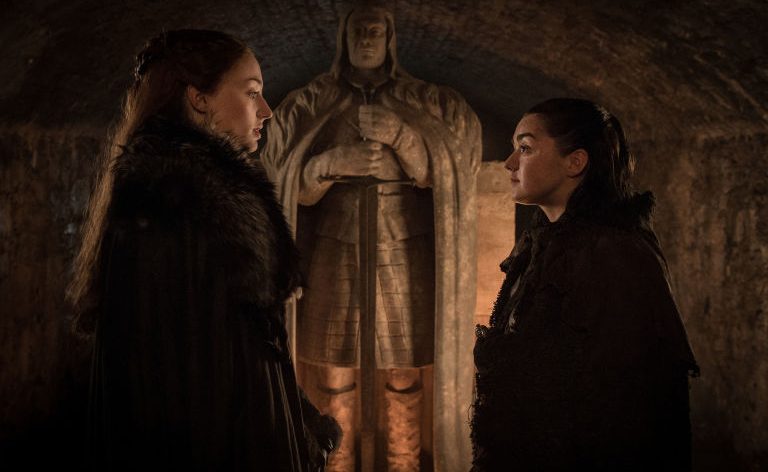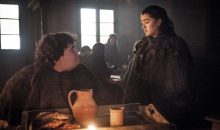Game of Thrones Episode 4: The Spoils of War
“I had forgotten what a small and noisy people they are…I would bring them dragons, and they shout out for grapes.”
“Grapes are real. A man can gorge himself on grapes. Their juice is sweet, and they make wine. What do dragons make?”
“Woe.”
So spoke Euron and Victarion Greyjoy in A Feast for Crows. The latter was excised from Game of Thrones and the former was absent from “The Spoils of War,” but their words make a fine template for the episode. Things grow even in Westeros’s blood-soaked soil, and small and humble as they may be, they make for nourishment and joy. Still, there’s a shadow over the vineyards. We’ve heard of dragons, seen them born, watched them grow; seen hints of their power and terror, writ small or from a distance. In a climax up there with Thrones‘s very best episodes, the scope collapsed into full reality, as awe-inspiring as it was horrifying.
It was a stunning turn from the first half of “Spoils,” which revolved around as many reunions as Thrones has yet served us in one episode. Arya’s return to Winterfell (a snowy homage to one of the first shots of the series) was a warm, fuzzy blanket for the soul. Of all the long separations inflicted on the cast, that of the Stark sisters may have been the most painful — not for how much they missed one another, but for how close they weren’t. There were no snowflakes melting in anyone’s hair, no tearful goodbyes, only preteen squabbles and horror. Many years and seasons later, Sansa and Arya have become very different people. A shared respect for one another’s newfound competence would have been enough to build on, but the love was there too.
Arya’s meeting with Bran provided another affecting jolt, albeit at the emotional remove at which all of Bran’s scenes now stand as the extent of his sacrifice becomes clear. (The long-suffering Meera Reed’s heart-struck delivery of “You died in that cave” was nearly unnecessary.) There was also Arya’s seemingly low-stakes duel with Brienne, emphatically less so by the second, and her significant glance with Littlefinger, who must feel the jaws of the trap closing on him by the second. But for all the various tensions and unanswered questions underlying this lineup of greetings, so much emotional lift was provided just by seeing Arya riding over that hilltop, sitting in those familiar grounds. As far as viewers or readers are concerned, Winterfell itself is the heart of Westeros, our entry point into the world and a barometer for the state of the Starks whose fortunes we’ve been entangled with. And all of Winterfell’s children have come home.
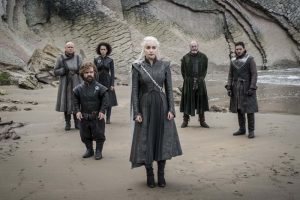
i really appreciated Davos trying to extricate himself from this awkwardness
Except for the one who left, anyway. The contrivance that leaves Jon Snow gently imprisoned on an island seems thinner and thinner in hindsight, but at least he’s using his time wisely — flirting with a hot-tempered woman in a cave. That, and unearthing, along with his dragonglass, historical antecedents of the War for the Dawn. Portraying some haply discovered cave paintings as the keystone of an alliance with Daenerys would have been too much of a stretch, but thankfully, “Spoils” held back from that. Dany and Jon built enough rapport that she was inclined to believe him, but belief is only part of the recipe. For all the moral excellence praised by Missandei (in an only moderately cringey scene), Daenerys remained too familiar with the varied uses and forms of power to surrender any of it.
And when word came of her full reverses, the dark side of that power surged to the fore. Thrones has coyly tweaked its portrayal of Daenerys in a way that doesn’t always convey the conflicted person it probably intends to. She’s propped up as a savior figure, the absurd idea of a “revolutionary queen,” commanding ardent loyalty from a potpourri of peoples otherwise invested in the question of who sits on an uncomfortable chair in a pasty, angry kingdom. But throughout her rise to power, she’s been imperious, ruthless, and downright vicious, to the point where it often comes off as inconsistency rather than turmoil. That said, Dany’s rage on the beach (brought to life admirably by Emilia Clarke, who hasn’t gotten a chance to be that mad in a very long time) was a step in the right direction, and her ensuing actions followed suit.
It must now be accepted that war on Game of Thrones isn’t a strategic endeavor, but a battle of wills and an exchange of costs. Principal characters make a difficult decision, or commit themselves to a risk, and all of the logistics fall amiably into place. So one could well question the timing of Daenerys’s ambush, or wonder at the experienced Randyll Tarly’s failure to catch wind of an entire khalasar approaching, or ask just where the hell all those Dothraki were waiting around in the first place. But it’s more rewarding to accept the conventions of the TV form, where the maneuvers of armies are the expression of protagonist choice. Who knows? Maybe the Dothraki have been raiding the Stormlands this entire time. It’s not like anyone would notice.
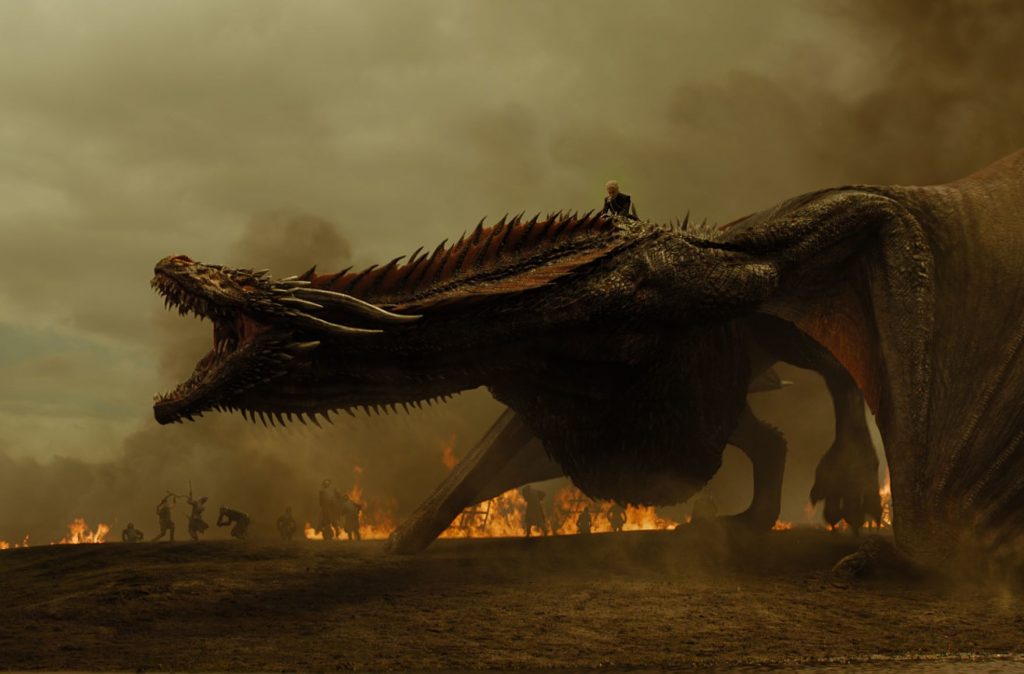
mom likes ME best, rhaegal
Because, after all, it’s hard to notice anything when you’re looking down the barrel of a dragon. The Second Field of Fire (just like the first one, a union of the Reach and the West against a Targaryen invader) was a triumph by any standards, up there with the very best battles Thrones has given us. What “Spoils” lacked in the perfectly structured expanse of “Blackwater” or the frightening tension of “Hardhome,” it made up for in straightforward tactics, high-budget action, and the deployment of a fully operational battle Drogon. From the astounding stunt work of the Dothraki cavalry, to the wandering shot of Bronn’s quest for Qyburn’s scorpion, to the nightmarish effects of dragonfire on the human body, it’s hard to ask for better craft in the area of “showing people dying on screen.”
And when Thrones is really at its best, it plays spectacle and meaning with both hands. It asks viewers to question the worthiness of the satisfying, awe-inspiring, or just plain cool stuff it shows them in a way that’s more thoughtful than a simple Screw you, viewer, for enjoying this! The battle of “Spoils” didn’t reach that at every point; the Dothraki, with an egregious faux-Indian war whoop and precisely one line of dialogue between them, remain painfully underserved since their reintroduction. But by the logic of war-as-extension-of-character, the Second Field of Fire pitted sympathetic people against one another better than any battle since “Blackwater,” and then showed us the extent of the cost.
Whatever their destination, the wagons were full of grain and gold, enough to feed one kingdom and make a down payment on stockpiles for the rest. When Daenerys released Drogon to burn the fields, however tactically sound, she also contributed to the very starvation of Westeros that she initially planned to avoid. To make it worse, her opposing number had the opportunity to show viewers his best self. Jaime Lannister was by turns charming (bantering with Bronn), compassionate
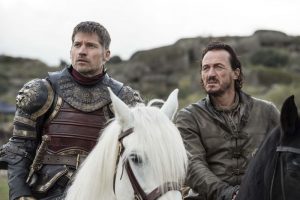
“I’ve made a huge mistake.”
(holding back Randyll’s excesses), understanding (commiserating with Dickon on his first battle), and finally, insanely brave (charging a fucking dragon! with one hand!) That final scene of Jaime’s mad charge and Dany’s struggle to heal her wounded “child” was Thrones writ small — two flawed, well-meaning people, spurred to separate acts of unbelievable heroism in direct conflict with one another, while thousands die as a result.
It certainly wrung at Tyrion’s heartstrings, in a moment that echoed the reunion of the Stark children. And it was enough to inspire even Bronn of the Blackwater, as self-interested a person as Westeros has ever seen, to risk his life far above and beyond his pay grade. Jaime almost certainly lived through his plunge — he’s the valonqar, after all, he has work to do — but we may find out that Bronn was the sacrifice to the hungry gods of the battlefield. If so, he was far from the least deserving person to die on the Field of Fire. And that is something that Daenerys will have to reckon with, along with all the rest.
Quick hits:
- Yes, Theon is an adopted Stark, thematically speaking. It’s all over the text. Fight me about it.
- Tough one for Theon, by the way. I would watch a quick Curb Your Enthusiasm parody starring Theon Greyjoy getting into more and more awkward situations that are entirely his own fucking fault.
- Not much to say about Cersei here. Her brief check-in mainly served to establish stakes for the lost Highgarden convoy, and drop some hints about what might come next. Including…
- The Golden Company! This is their second mention on the show, and like the first, probably just an Easter egg. There’s no way a rival claimant, let alone the whole concept of the Blackfyres, is being introduced at this stage. (It’s no coincidence that all the supplementary “history of Westeros” material has focused on the Dance of the Dragons as its great inter-Targareyn conflict of note). But if the Company does appear, even as hired mooks, their maneuvers might shed some light on what to expect in The Winds of Winter.
- I would be remiss if I didn’t bring up what a great episode of dialogue this was for Davos Seaworth, whose captivity is clearly wearing on him. That is one salty onion.
- Hey kids, it’s MLB All-Star Noah Syndergaard!
- And finally, here be wild theorizing. Purely speculative spoilers below, so avoid if you like:
It seems that the show is spinning up the wheels to reveal that Littlefinger was behind the attempt on Bran’s life. This is logistically unfeasible but as we’ve discussed, the show isn’t terribly worried about that. A Song of Ice and Fire, of course, pinned the blame on Joffrey, an explanation that was definitely plausible but always, to me, lacked the craft and resonance of the books’ other revelations. Petyr Baelish’s culpability would be much more thematically fitting, what with his personal history of fucking over the Starks at every turn.
I’m starting to suspect that GRRM had initially intended for Littlefinger to be behind the murder, then decided he couldn’t make the continuity work to his satisfaction and called an audible. I could be totally off on this, but I like that sort of craft speculation. And it would work for one of my favorite things about Thrones — the ability to go back and tweak things that every author, no matter how thoughtful and hard-working, wishes they could have done better.

